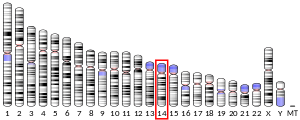PPP1R13B
Apoptosis-stimulating of p53 protein 1 is a protein that in humans is encoded by the PPP1R13B gene.[5][6]
This gene encodes a member of the ASPP (apoptosis-stimulating protein of p53) family of p53 interacting proteins. The protein contains four ankyrin repeats and an SH3 domain involved in protein-protein interactions. ASPP proteins are required for the induction of apoptosis by p53-family proteins. They promote DNA binding and transactivation of p53-family proteins on the promoters of proapoptotic genes. Expression of this gene is regulated by the E2F transcription factor.[6]
References
- 1 2 3 GRCh38: Ensembl release 89: ENSG00000088808 - Ensembl, May 2017
- 1 2 3 GRCm38: Ensembl release 89: ENSMUSG00000021285 - Ensembl, May 2017
- ↑ "Human PubMed Reference:".
- ↑ "Mouse PubMed Reference:".
- ↑ Nagase T, Ishikawa K, Suyama M, Kikuno R, Miyajima N, Tanaka A, Kotani H, Nomura N, Ohara O (Apr 1999). "Prediction of the coding sequences of unidentified human genes. XI. The complete sequences of 100 new cDNA clones from brain which code for large proteins in vitro". DNA Res. 5 (5): 277–86. doi:10.1093/dnares/5.5.277. PMID 9872452.
- 1 2 "Entrez Gene: PPP1R13B protein phosphatase 1, regulatory (inhibitor) subunit 13B".
Further reading
- Liu ZJ, Lu X, Zhong S (2005). "ASPP--Apoptotic specific regulator of p53". Biochim. Biophys. Acta. 1756 (1): 77–80. doi:10.1016/j.bbcan.2005.08.002. PMID 16139958.
- Samuels-Lev Y, O'Connor DJ, Bergamaschi D, et al. (2001). "ASPP proteins specifically stimulate the apoptotic function of p53". Mol. Cell. 8 (4): 781–94. doi:10.1016/S1097-2765(01)00367-7. PMID 11684014.
- Strausberg RL, Feingold EA, Grouse LH, et al. (2003). "Generation and initial analysis of more than 15,000 full-length human and mouse cDNA sequences". Proc. Natl. Acad. Sci. U.S.A. 99 (26): 16899–903. doi:10.1073/pnas.242603899. PMC 139241. PMID 12477932.
- Heilig R, Eckenberg R, Petit JL, et al. (2003). "The DNA sequence and analysis of human chromosome 14". Nature. 421 (6923): 601–7. doi:10.1038/nature01348. PMID 12508121.
- Ota T, Suzuki Y, Nishikawa T, et al. (2004). "Complete sequencing and characterization of 21,243 full-length human cDNAs". Nat. Genet. 36 (1): 40–5. doi:10.1038/ng1285. PMID 14702039.
- Bergamaschi D, Samuels Y, Jin B, et al. (2004). "ASPP1 and ASPP2: common activators of p53 family members". Mol. Cell. Biol. 24 (3): 1341–50. doi:10.1128/MCB.24.3.1341-1350.2004. PMC 321425. PMID 14729977.
- Colland F, Jacq X, Trouplin V, et al. (2004). "Functional proteomics mapping of a human signaling pathway". Genome Res. 14 (7): 1324–32. doi:10.1101/gr.2334104. PMC 442148. PMID 15231748.
- Hershko T, Chaussepied M, Oren M, Ginsberg D (2005). "Novel link between E2F and p53: proapoptotic cofactors of p53 are transcriptionally upregulated by E2F". Cell Death Differ. 12 (4): 377–83. doi:10.1038/sj.cdd.4401575. PMID 15706352.
- Fogal V, Kartasheva NN, Trigiante G, et al. (2005). "ASPP1 and ASPP2 are new transcriptional targets of E2F". Cell Death Differ. 12 (4): 369–76. doi:10.1038/sj.cdd.4401562. PMID 15731768.
- Liu ZJ, Lu X, Zhang Y, et al. (2005). "Downregulated mRNA expression of ASPP and the hypermethylation of the 5'-untranslated region in cancer cell lines retaining wild-type p53". FEBS Lett. 579 (7): 1587–90. doi:10.1016/j.febslet.2005.01.069. PMID 15757645.
- Bergamaschi D, Samuels Y, Zhong S, Lu X (2005). "Mdm2 and mdmX prevent ASPP1 and ASPP2 from stimulating p53 without targeting p53 for degradation". Oncogene. 24 (23): 3836–41. doi:10.1038/sj.onc.1208535. PMID 15782125.
- Agirre X, Román-Gómez J, Jiménez-Velasco A, et al. (2006). "ASPP1, a common activator of TP53, is inactivated by aberrant methylation of its promoter in acute lymphoblastic leukemia". Oncogene. 25 (13): 1862–70. doi:10.1038/sj.onc.1209236. PMID 16314841.
This article is issued from
Wikipedia.
The text is licensed under Creative Commons - Attribution - Sharealike.
Additional terms may apply for the media files.




